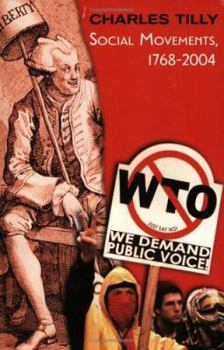Social Movements, 1768 - 2004
Select Format
Select Condition 
Book Overview
The updated and expanded third edition of Tilly's widely acclaimed book brings this analytical history of social movements fully up to date. Tilly and Wood cover such recent topics as the economic... This description may be from another edition of this product.
Format:Paperback
Language:English
ISBN:1594510431
ISBN13:9781594510434
Release Date:May 2004
Publisher:Routledge
Length:194 Pages
Weight:0.70 lbs.
Dimensions:0.6" x 6.1" x 8.9"
Customer Reviews
2 ratings
Too simplistic of an approach
Published by Thriftbooks.com User , 16 years ago
The book is fine, well researched and whatever, but I felt that his approach was far too simplistic. In addition, his theory of WUNC (worthiness, unity, numbers and commitment) does not even take into consideration leadership or the use of violence. In addition, his writing style is incredibly annoying - he begins with a VERY specific, in-depth example and you do not even find out what he is talking about until five pages into each chapter - so instead of giving us an outline of his argument, we are left to search through pages to find his main points.
Studying social movements requires the study of history
Published by Thriftbooks.com User , 18 years ago
Charles Tilly decided to write this book for 2 reasons: he needed something meaningful to do during his approximately 5 month treatment of chemotherapy and secondly, Sidney Tarrow decided to not write a social movement's history. Tilly thinks that a historical narrative is required to understand social movements. "History...helps because it identifies significant changes in the operation of social movements...and...because it calls attention to the shifting political conditions that made social movements possible" (pg. 3). Philosophically, Tilly is a historicist who refuses to "search for grand laws in human affairs comparable to the laws of Newtonian mechanics" this attempt, Tilly says, has "utterly failed" (pg. 9). Instead, a better "effort necessarily depends on turning away from 'laws' of social movements toward causal analogies and connections between distinctive aspects of social movements and other variables of politics" (pg. 10). To that end, Tilly pursues 9 main arguments in this book: (1) From their 18th century origins onward, social movements have proceeded not as solo performances, but as interactive campaigns. (2) Social movements combine 3 kinds of claims: program, identity, and standing. (3) The relative salience of program, identity, and standing claims varies significantly among social claimants within movements, and among phases of movements. (4) Democratization promotes the formation of social movements. (5) Social movements assert popular sovereignty (6) As compared with locally grounded forms of popular politics, social movements depend heavily on political entrepreneurs for their scale, durability, and effectiveness. (7) Once social movements establish themselves in 1 political setting, modeling, communication, and collaboration facilitate their adoption in other connected settings (8) The forms, personnel, and claims of social movements vary and evolve historically. (9) The social movement, as an invented institution, could disappear or mutate into some quite different form of politics (pgs. 12-14, 35-37,150-152). Tilly pays very little attention to the history and power of ideas (this may annoy some Political Theorists). Also, according to Richard Hogan's book review in "Contemporary Sociology," proponents of the resource mobilization model and political process model of social movements will find Tilly's overall approach as a challenge and opposing view.






